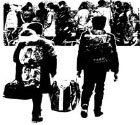 The world is witnessing its largest annual migration. With the approach of the Chinese lunar new year, over the next 40 days, masses of people will be moving across China to return to their hometowns or relatives then go back to their workplaces. The world is witnessing its largest annual migration. With the approach of the Chinese lunar new year, over the next 40 days, masses of people will be moving across China to return to their hometowns or relatives then go back to their workplaces.
Such intense use of the public infrastructure by hundreds of millions of people (and there is little chance of the numbers shrinking any time soon) during such a short period of time is frightening. Even though people ask themselves from time to time why no similar phenomenon is seen in the United States, Europe or India, there is no way to moderate the Chinese migration wave. It reminds us of the country's tradition as a centralized empire, which is so deeply-rooted that people even observe their folk festivals according to the same standards. But in the era of the market economy, it is also surprising that businesses and local governments haven't taken advantage of this tremendous latent demand for diversity to create or even recreate more local festivals. There could well be a Peking Opera Festival in Beijing. It could include national opera singers' competitions and parade all related new cultural products every autumn, the best season in the city. In Shanghai, the nation's window to the world in early modern times, there could well be a Shanghai International Day, a celebration for Chinese and foreigners. Trade shows, art events and more could be organized around the arrival date of the first Jewish refugees from Nazi-occupied Europe. Although there have been officially sponsored celebrations in various cities, they have never been developed with the goal of mass appeal. The events do not involve most of the locals, unlike traditional festivals. In fact, having the government help citizens run their festivals makes good sense. It certainly would help build a harmonious society.  Even during traditional festivals, there could be a different line of activities. On the southern part of Beijing's Third Ring Road, there could be a Zhejiang Festival to create a friendly mingling of the city's long-time residents and the newly settled garment and textile merchants from Zhejiang Province. Even during traditional festivals, there could be a different line of activities. On the southern part of Beijing's Third Ring Road, there could be a Zhejiang Festival to create a friendly mingling of the city's long-time residents and the newly settled garment and textile merchants from Zhejiang Province.
In Shenzhen, the special economic zone across from Hong Kong, there could be two festivals for cab drivers one for those from Hunan and another for taxi drivers from China's northeastern provinces. The mayor could preside over a karaoke competition for them. For a place grown from a fishing village to a world-class manufacturing base, Shenzhen should have a festival every month to celebrate its migrant workers, with different provinces celebrated each month. Such festivities will help new settlers feel more at home in their adopted cities and will help cities build their new identities. Actually, many things were tried out in China's recent past to somehow trim the massive yearly travel volume, from asking migrant workers to spend the holidays at their workplaces to raising the price of holiday-season travel tickets. But it is cruel to just feed the workers with a free bowl of noodles in their makeshift dorms on dirty construction sites. It makes them all the more homesick. Raising ticket prices for the low-income masses is an even more heartless thing to do. After all the attempts failed to distract the would-be travelers, their volume has kept growing. This year, based on the forecast of a seemingly small increase (less than 5 percent) from the country's 2006 record, according to the National Development and Reform Commission, China's transportation systems will have to accommodate 2.17 billion trips. (China Daily 02/05/2007 page4)
|

